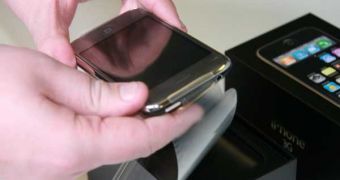With Christmas come and gone, analysts and bloggers alike have started speculating over how many iPhone units Apple could have sold, should it have been possible to wrap it as a gift and put it under the tree.
Advertising Age puts it as blunt as possible: “ [...] It's impossible to surprise someone with an iPhone. To get one, the owner must appear in person and sign a two-year contract with a wireless carrier (in this case, AT&T). You can't even purchase one for someone who is already a subscriber. That restriction likely cost Apple a lot of potential revenue.” At least one estimate claims that, because of this, Apple has lost a whopping $80 million in holiday sales.
Andrew Murphy, an analyst with Piper Jaffray, deducted that Apple sold around 3.8 million handsets during the month ending December 2008. This, he estimates, is just over half of fourth-quarter unit sales. Considering the above mentioned scenario, Apple has lost between 300,000 and 400,000 potential iPhone buyers who would have acquired the handset for a loved one, as a gift. “Could [sales] be higher [...] if it was easier to gift?” Mr. Murphy rhetorically asks. “Yes, you could say they could have sold more.”
On the other hand, CCS Insight's John Jackson points out to the fact that Apple has to have priorities. “Apple is bigger than Christmas. I wouldn't have necessarily done it any other way. I suspect Apple has few regrets,” he notes.
Also, Apple can't possibly regret for going with AT&T in the US, the report continues. Besides the the two-year contract that raises the affordability of the phones, analysts point out to exclusivity in certain territories. In Larry Swasey's opinion, “It's such a great phone that you really need a strong carrier that's going to commit to it, market it [...] make it their top phone, and have a strong customer base and a network that fits with what the phone is trying to do. AT&T had all of that.” Swasey is a wireless analyst at Visant Strategies.
Back to Piper Jaffray's overview of the Mac maker's third business pillar, the firm strongly believes that Apple does have a way to get more iPhones into people's hands, and without the hassle of having the beneficiary present at the time of the purchase. You guessed it – iPhone nano! Piper Jaffray has faith in Apple launching a low-end iPhone by the end of Q1 2009.

 14 DAY TRIAL //
14 DAY TRIAL //